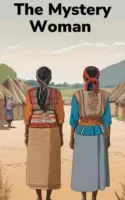At home I lie on my bed and open the pamphlet. It has pictures showing exactly what the woman showed me at her home. There it is: the pebbles, the sand in one bottle, the stick, the clear water…
If the villagers could see this they would know she isn’t a witch. If they knew about her husband it would explain everything. They would find out that she can actually help us, not harm us.
Just then Phindi comes in.
“You are lucky,” she says to me. Before I can show her the pamphlet she is shouting at me, her hands on her hips. “Do you realise what you have done? People say I misled them! I am making fools of them. My own little sister is sleeping with the enemy!”
I stare at her.
“I defended you. I stopped them from coming here to fetch you. But, I can’t defend you forever. For the last time, stay away from her,” Phindi emphasises. I see tears in her eyes. My sister is not a crier. This must be really upsetting her. She turns and is gone.
In the following days Phindi does not speak to me. When I try to talk to her she leaves the room.
“Phindi is just worried about you,” Mama says. “You know how people talk. The village is small. Rumours spread fast.”
“Do you think she is a witch, Mama?” I ask my mother, who is always so calm and reasonable.
She looks out of the window and doesn’t answer me.
I know what people will be saying about me. The rumour has spread that I was making spells with the woman, using bottles and water and pebbles. That the spells are causing the drought.
Acts of transgression – going against the accepted rules – in my conservative village result in severe punishment. In know my act of rebellion in visiting the woman is seen as a reflection of my parents’ lack of discipline – ukungaqeqeshwa. To be a product of good ukuqeqeshwa is a prize not only for the child, but for the family and the village. And now I have brought shame on the family.
“There is an explanation,” I tell Mama. “It is simple. I will show you.”
I run to our bedroom to fetch the pamphlet. Mama will see sense when she reads it. She will help me to persuade the villagers that what they are doing is wrong. But when I look for the pamphlet where I left it, it is gone. Phindi! I run outside to the circle of stones inside which we sometimes make a fire. I bend down. There it is, burned. There goes my evidence. Only a small part of the edge is left.
That night I hear singing outside. Phindi has not come home. I go outside to see a group of church members with a bowl of ‘holy water’.
“Are you coming?” Phindi asks me.
Do I have a choice? If I refuse it will bring more shame on the family. And then I see in the gloom that one of the people is the Minister, and next to him my mother is standing.
“We are going to use holy water around her home to chase away the wicked spirits,” says Phindi.
“We have prayed and still there is no rain. I had a sign,” said the Minister. “It came to me in a dream. That we must cleanse this woman’s home to break the drought she has brought on the village.”
“But–”
Phindi yanks my arm. “But nothing.”
The others are singing again as they walk down the path towards her house. The moon is full and the grasses shimmer in the moonlight.
What will happen when the woman hears them singing? Will it stop at them sprinkling water? I know some of these women – how they get worked up with emotion. They will go in to fetch the woman from her hut. And if she resists? If she refuses to be cleansed by the water? What then?
“She will confess her sins,” says Nomvula next to me.
“And what if she doesn’t?”
“Then she must face the consequences.”
The group form a circle around her hut. I look for the water bottles but they are gone. There is no light inside. She must be sleeping. Not for much longer, I think.
The singing starts. Still there is no sign, no noise from inside.
The singing gets louder. The water is sprinkled around the hut.
Nomvula shouts, “Come out now, and be saved. Confess!”
There is silence. Everyone waits. Nothing happens.
Then Nomvula walks to the door, throws it open and marches inside.
***
Tell us what you think: What will the villagers do?


